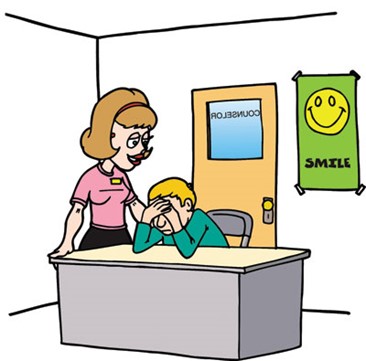During your senior year of high school, you have a lot to deal with. You’ve got to maintain your grades, apply to colleges, make sure your standardized tests are completed, find scholarships, fill out financial aid forms, and still manage to have a great last year with friends. Who are you supposed to turn to when you have questions? There is one person who can help with all of it—your guidance counselor, a valuable, knowledgeable, and probably under-utilized resource.
“Having a good relationship with your guidance counselor is extremely important. In your senior year, you need a lot from your counselor, including letters of recommendation and help figuring out applications for colleges and scholarships,” says Kathy, a high school guidance counselor from Florida who requested that her name be withheld.
Opening doors
Counselors have access to many resources students may be unaware of. Scholarships come into guidance offices and are distributed to counselors before they reach students. They also have strong relationships with local, state, and national colleges.
relationships with local, state, and national colleges.
“We can literally pick up the phone and call a college while a student is sitting in our office,” says Kathy. “If the school is missing some paperwork, or needs some other piece of information, we can speed up the process a bit. We also have meetings with deans of admissions at certain colleges, so students can use our relationships to their benefit.”
It is important to get to know your counselor early on, so assistance can be tailored for you. Establishing a relationship freshman year can enable your counselor to monitor your grades and test scores, track progress with applications and essays, help you find internships or apprenticeships, and make suggestions on universities, majors, and financial aid. They can even help prepare you for job interviews.
“I had a good relationship with my counselor in high school,” says Courtney Farruggia, a college student from New Jersey. “She made herself available mostly for college-related issues. She definitely established a relationship with me, followed up on my progress, and professionally handled the situations.”
Ignoring counselors can cost you money and opportunities
Not all students have strong relationships with their counselors. Some do not ask questions or tap into counselors’ resources. Others are unaware of how helpful they are.
“Looking back on my high school career, I wish I took advantage of more tips and tricks from my counselor,” says Jeremy Black, a young New York professional. “I just never knew all the help they had to offer. I probably could have saved some money with scholarships, and maybe even gotten into other schools, had I sat down and talked about my future with my guidance counselor.”
Guidance counselors can be a sounding board for career decisions, provide input and advice based on students’ personal histories, and answer tough questions. Forming a good relationship with your counselor can be one of the most beneficial tools for students. After all, getting ready for the real world on your own can be pretty overwhelming!
